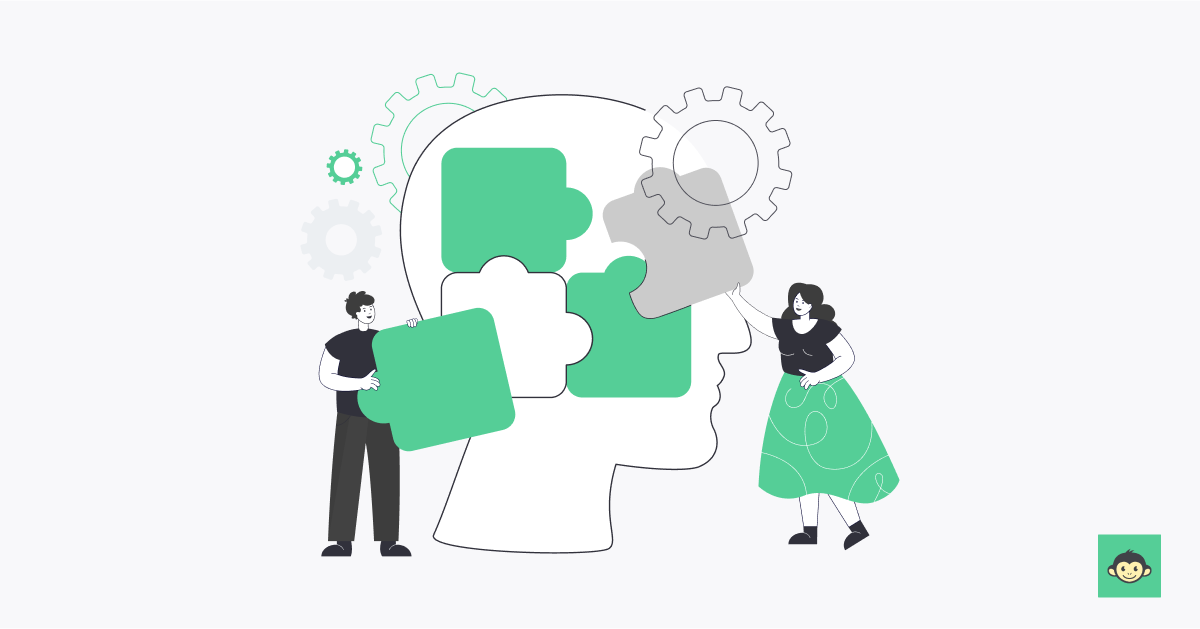Neurodiversity in the workplace: Why it is crucial for a positive company culture 2024

Neurodiversity encompasses a range of conditions, such as autism, ADHD, dyslexia, and more. While these conditions may come with their own set of challenges, they also bring an array of strengths that can be a game-changer in any organization.
Think of the remarkable attention to detail, unmatched focus, pattern recognition, and extraordinary problem-solving abilities that many neurodivergent individuals possess. By tapping into these strengths, companies can unlock a wellspring of innovation and untapped potential.
But here's the catch: to harness the power of neurodiversity, we need to create inclusive and supportive environments. It's not about fitting square pegs into round holes; it's about reshaping the holes to accommodate pegs of all shapes and sizes.
That means offering flexible work arrangements, fostering understanding and empathy, and providing the right tools and technologies to help everyone thrive.
This is where employee engagement enters the stage, like a trusty sidekick in our quest for workplace diversity and inclusion. With the right solutions, companies can streamline communication, collaboration, and task management, ensuring that all existing employees, regardless of their neurodivergent traits, can work together seamlessly.
It's like creating a virtual playground where everyone feels valued, understood, and empowered to contribute their very best.
In our fast-paced and ever-evolving world, it's crucial to recognize the beauty in our differences. Neurodiversity is not just a buzzword; it's a powerful concept that can revolutionize the way we work. So let's embrace the quirks, the unique perspectives, and the extraordinary talents that neurodivergent individuals bring to the table.
What is Neurodiversity in the workplace?

Neurodiversity in the workplace is a concept that recognizes and values the diverse range of neurological differences among individuals. It acknowledges that the human brain is wired in unique ways, and these differences, including conditions such as autism, ADHD, dyslexia, and more, should be embraced and accommodated in the professional environment.
Rather than viewing neurodivergent traits as disabilities or disorders that need to be fixed or cured, the neurodiversity paradigm perceives them as natural variations of the human mind. It promotes the idea that neurodivergent individuals possess distinct strengths and abilities that can contribute positively to the workplace.
Neurodivergent team members often bring a fresh perspective, enhanced problem-solving skills, attention to detail, high levels of focus, creativity, and out-of-the-box thinking to their work. By embracing neurodiversity, companies can tap into these unique strengths and create a more inclusive and innovative work environment.
To foster neurodiversity in the workplace, organizations need to adopt a holistic approach that includes the following elements:
Inclusive hiring process
Companies can actively seek to attract and hire neurodivergent talent by creating inclusive job descriptions, providing alternative application processes, and expanding recruitment efforts to reach neurodiverse people and communities.
Accommodations and support
It is essential to provide reasonable accommodations to enable neurodivergent employees to perform at their best. This may involve flexible work arrangements, personalized workspace adjustments, and assistive technologies.
Training and awareness
Promoting awareness and understanding of neurodiversity among all employees helps create a supportive and empathetic work environment. Training programs can educate staff about the strengths and challenges of neurodivergent individuals, fostering a culture of acceptance and appreciation.
Communication and collaboration tools
Implementing employee engagement software and other technological solutions can enhance communication, collaboration, and productivity. These tools can facilitate clear communication, simplify task management, and promote efficient teamwork.
Ongoing support and mentoring
Regular check-ins to support employees, mentorship programs, and career development opportunities provide the necessary support and guidance for neurodivergent employees to thrive and reach their full potential.
By embracing neurodiversity in the workplace, companies can unlock a wealth of talent, foster innovation, and create an environment where all employees can contribute and succeed.
It is a paradigm shift that values differences, promotes inclusivity, and ultimately leads to a more vibrant and successful organization.
Benefits of neurodiversity in the workplace

The benefits of neurodiversity in the workplace are numerous and impactful. By embracing a neurodiverse workforce and accommodating the unique strengths and perspectives of such individuals, organizations can experience the following advantages:
1. Increased innovation
Neurodivergent individuals often possess exceptional problem-solving skills, creativity, and a different way of approaching challenges. Their distinct perspectives and unconventional thinking can spark innovation and lead to fresh ideas and solutions that might not have been considered otherwise.
By tapping into this wellspring of creativity, companies can gain a competitive edge and drive positive change.
2. Enhanced productivity
They frequently exhibit high focus and attention to detail and can excel in tasks requiring precision, accuracy, and meticulousness. Leveraging these strengths can significantly enhance productivity in roles that demand meticulous analysis, quality control, or data-driven tasks.
3. Diverse skill sets
Neurodiversity brings a wide range of skills and abilities to the table. Such individuals excel in areas such as pattern recognition, memory retention, information processing, and specialized knowledge.
By harnessing these diverse skill sets, organizations can build well-rounded teams that complement each other's strengths and work collaboratively toward shared goals.
4. Improved problem-solving
Neurodivergent individuals tend to think outside the box and approach problems from unique angles. They can offer alternative perspectives and unconventional solutions to complex challenges.
This diversity of problem-solving approaches can lead to more comprehensive and effective outcomes as different viewpoints are considered and integrated.
5. Strong attention to detail
Many neurodivergent individuals possess an exceptional eye for detail and an ability to spot patterns or inconsistencies that others might overlook.
This meticulous attention to detail can be invaluable in fields such as quality assurance, data analysis, cybersecurity, and research, where accuracy and precision are paramount.
6. Enhanced workplace culture
Embracing neurodiversity fosters an inclusive and accepting workplace culture. It sends a powerful message to all employees that their differences are valued, respected, and celebrated.
This positive work environment promotes employee satisfaction, engagement, and loyalty, ultimately leading to improved retention rates and attracting top talent.
7. Broader customer reach
Neurodiversity in the workplace can help organizations better understand and cater to diverse customer needs. By having a workforce that reflects the diversity of their customer base, companies can gain insights into diverse perspectives, preferences, and experiences.
This understanding can lead to the development of products and services that meet a broader range of customer requirements.
8. Increased adaptability
Neurodivergent individuals often exhibit a high degree of adaptability to change. Their ability to navigate through transitions and uncertainties can be a valuable asset in dynamic work environments.
Embracing neurodiversity fosters a workplace culture that thrives on flexibility and openness to new ideas, making the organization more resilient in the face of evolving challenges.
9. Unique communication styles
Neurodivergent individuals may bring unique communication styles to the workplace, enhancing the team's overall communication dynamics.
Their diverse approaches to expressing ideas and conveying information can enrich collaboration and contribute to a more vibrant exchange of thoughts within the organization.
10. Increased empathy and understanding
Neurodivergent individuals often develop heightened levels of empathy and understanding, stemming from their own experiences navigating a world that may not always be attuned to their needs.
This heightened empathy can foster a more compassionate workplace where employees better understand and support each other, leading to improved teamwork and a positive work environment.
11. Innovation in accessible design
Neurodivergent individuals, with their unique perspectives, can contribute significantly to the development of more accessible and inclusive designs in products, services, and workplace environments.
Considering their firsthand experiences, they can identify barriers and propose solutions that enhance accessibility for individuals with various needs, thereby promoting a more inclusive society.
In summary, embracing neurodiversity in the workplace brings numerous benefits, including increased innovation, enhanced productivity, diverse skill sets, improved problem-solving, attention to detail, positive workplace culture, and a broader customer reach.
By recognizing and leveraging the strengths of neurodivergent individuals, organizations can unlock their full potential and foster a more inclusive and successful work environment.
Neurodiversity in the workplace statistics

Here are some interesting statistics on neurodiversity in the workplace.
- A study done by Hewlett Packard Enterprise showed that the neurodiverse teams are 30% more productive than the others.
- JPMorgan reported that professionals in its Autism at Work initiative made fewer errors and were 90% to 140% more productive than neurotypical employees.
- A Deloitte report found that companies with inclusive cultures were 6 times more likely to be innovative and agile.
- According to Harvard Business Review, Over 40 intermediaries facilitating neurodiverse workforce initiatives are currently operational throughout the United States.
What are neurodiversity issues in the workplace?

In today's diverse workplaces, understanding and addressing neurodiversity issues are crucial for fostering an inclusive environment. Neurodiversity encompasses a range of conditions such as autism, ADHD, obsessive-compulsive disorder (OCD), dyslexia, and others, presenting unique challenges and opportunities.
Here are key neurodiversity issues that organizations should be cognizant of:
- Awareness gaps: Many workplaces lack sufficient awareness of neurodiversity, leading to misconceptions and stigmas. An essential issue is the need for comprehensive education to ensure a well-informed workforce.
- Inadequate accommodations: Insufficient accommodations for neurodivergent individuals can hinder their productivity. This includes adjustments to physical workspaces, flexible scheduling, and tailored communication methods that cater to their specific needs.
- Communication challenges: Neurodivergent individuals may face difficulties in traditional communication settings. Organizations need to implement strategies that facilitate effective communication, ensuring that all team members can express themselves comfortably.
- Sensory sensitivities: Many neurodivergent individuals experience heightened sensitivities to sensory stimuli. Inadequate consideration of these sensitivities in the workplace environment can lead to discomfort and reduced productivity.
- Social integration: Building and maintaining social connections in the workplace may be challenging for neurodivergent individuals. This issue emphasizes the need for inclusive initiatives that encourage team bonding and understanding.
- Career advancement barriers: Neurodivergent individuals may encounter barriers to career advancement due to biases or lack of recognition for their unique skills. Organizations must actively create pathways for their professional growth.
- Mental health struggles: The workplace environment can contribute to mental illness or health challenges for neurodivergent individuals. Organizations need to promote a supportive culture that recognizes and addresses the mental health conditions needs of all employees.
- Stigmatization and discrimination: Stigmatization and discrimination against neurodivergent individuals persist in some workplaces. Addressing these biases is crucial for creating an inclusive atmosphere where everyone feels valued and respected.
- Lack of training for managers: Managers may lack the necessary training to understand and support neurodivergent employees effectively. This issue highlights the importance of providing managerial training programs focused on neurodiversity.
- Limited resources for support: In some workplaces, there may be a lack of resources dedicated to supporting neurodivergent individuals. Allocating resources for mentorship programs, support networks, and specialized training can address this issue.
- Unconscious bias: Unconscious biases related to neurodiversity can influence hiring decisions, team dynamics, and overall workplace interactions. Organizations must actively work to mitigate unconscious biases through awareness campaigns and inclusive hiring practices.
Importance of neurodiversity programs in the workplace

Neurodiversity programs in the workplace are of great importance for fostering inclusivity, unlocking untapped talent, and promoting a culture of innovation. Here are some key reasons why neurodiversity programs hold significance:
1. Inclusion and diversity
Neurodiversity programs demonstrate a commitment to creating an inclusive work environment where individuals of all neurotypes are valued and respected.
Embracing neurodiversity goes beyond mere compliance with diversity and inclusion initiatives; it showcases a genuine appreciation for the unique strengths and perspectives that neurodivergent individuals bring to the table.
2. Talent acquisition and retention
Implementing neurodiversity hiring programs can help attract and retain a diverse pool of talent.
By actively recruiting neurodivergent individuals and providing appropriate support, organizations expand their talent pool and gain access to individuals with exceptional abilities and strengths that align with specific job requirements.
Neurodiversity initiatives also contribute to higher employee satisfaction and retention rates, as employees feel valued and supported in the workplace.
3. Innovation and problem-solving
Neurodivergent individuals often possess exceptional problem-solving skills and exhibit unique approaches to challenges. By including neurodivergent people as employees in the workforce, organizations can tap into their diverse perspectives, out-of-the-box thinking, and creative problem-solving abilities.
This diversity of thought leads to more innovative solutions and can give companies a competitive edge in the marketplace.
4. Enhanced team dynamics
Neurodiversity programs promote diverse team dynamics by fostering collaboration, mutual learning, and increased understanding among team members.
Neurodivergent individuals can offer different ways of thinking, challenge conventional approaches, and bring fresh insights to the table.
This diversity of perspectives enhances teamwork, drives creativity, and leads to more robust and well-rounded decision-making processes.
5. Positive work culture and employee well-being
By embracing neurodiversity, organizations cultivate a culture of acceptance, empathy, and respect. This inclusive work environment promotes employee well-being, job satisfaction, and mental health.
Employees feel more comfortable being their authentic selves, resulting in increased engagement, productivity, and overall happiness in the workplace.
6. Customer satisfaction
Neurodiversity programs can contribute to better understanding and meeting the needs of diverse customer bases. Neurodivergent individuals often possess unique insights into the experiences and preferences of neurodivergent customers.
By incorporating their perspectives, companies can develop more inclusive products, services, and marketing strategies, leading to improved customer satisfaction and loyalty.
7. Workplace flexibility and accommodation
Neurodiversity programs encourage organizations to adopt flexible work policies and accommodations that cater to the diverse needs of neurodivergent employees.
This flexibility can include alternative work arrangements, customized workspaces, or modified communication methods, fostering an environment where every individual can thrive based on their unique strengths and challenges.
8. Career development opportunities
Implementing neurodiversity programs involves creating tailored career development plans for a neurodivergent employee.
By recognizing and nurturing their unique talents, organizations can help neurodivergent individuals advance in their careers and contribute meaningfully to the company's success. This not only benefits the individuals but also adds to the overall diversity of leadership within the organization.
9. Legal and ethical compliance
Neurodiversity programs demonstrate a commitment to legal and ethical standards related to inclusivity and non-discrimination.
By embracing neurodiversity, organizations align with evolving legal frameworks that promote equal opportunities for individuals of all neurotypes.
This not only helps in avoiding potential legal issues but also enhances the organization's reputation as a socially responsible and ethical employer.
In summary, neurodiversity programs promote inclusivity, foster innovation, enhance team dynamics, and create a positive work culture.
By embracing neurodiversity, organizations can tap into the vast potential of a neurodivergent workforce and individuals, driving success and achieving a competitive advantage in today's diverse and dynamic business landscape.
Why hire neurodivergent workers?
Hiring neurodivergent workers is not just an ethical choice but a strategic decision that can significantly benefit organizations. Neurodivergent individuals, encompassing conditions such as autism, ADHD, and dyslexia, bring a unique set of skills and perspectives to the workplace.
One of the primary advantages is the potential for enhanced innovation. Neurodivergent individuals often possess exceptional problem-solving abilities, creativity, and a different approach to challenges, contributing to a more diverse and innovative workforce.
Moreover, neurodivergent individuals frequently exhibit high levels of focus and attention to detail, excelling in tasks that demand precision and meticulousness. This attention to detail is particularly valuable in fields such as quality assurance, data analysis, and research.
Their diverse skill sets encompass areas such as pattern recognition, memory retention, and specialized knowledge, enriching the capabilities of the overall team.
Embracing neurodiversity in the workforce also contributes to improved problem-solving. Neurodivergent individuals tend to think outside the box, offering alternative perspectives and unconventional solutions to complex challenges.
This diversity in problem-solving approaches leads to more comprehensive and effective outcomes as different viewpoints are considered and integrated.
Ultimately, hiring neurodivergent workers fosters a workplace culture of inclusion, innovation, and enhanced productivity, positioning organizations for long-term success in an increasingly competitive and diverse global market.
What are examples of Neurodiversity at work?

Neurodiversity at work encompasses a wide range of neurodivergent conditions and traits. Here are some examples of neurodiversity in the workplace:
Autism Spectrum Disorder (ASD)
Autism is a neurodevelopmental condition that affects social interaction, communication, and behavior. Autistic employees often possess exceptional attention to detail, pattern recognition, and specialized knowledge in specific areas.
They may excel in roles that require systematic thinking, data analysis, software development, or creative problem-solving.
Attention Deficit Hyperactivity Disorder (ADHD)
ADHD is a neurodevelopmental condition characterized by difficulties with attention, hyperactivity, and impulsivity. Neurodivergent individuals with ADHD may have high energy levels, think quickly, and multitask effectively.
They can bring a unique sense of urgency, adaptability, and creativity to their work, thriving in fast-paced environments or roles that require quick decision-making.
Dyslexia
It is a learning difference that affects reading, writing, and spelling abilities. Individuals with dyslexia often have exceptional visual-spatial skills, problem-solving abilities, and creative thinking.
They may excel in roles that involve visual design, strategy development, or innovation where they can leverage their unique perspectives and strengths.
Dyspraxia
It's also known as developmental coordination disorder, affects motor coordination and planning. Neurodivergent individuals with dyspraxia may have excellent verbal or analytical skills but struggle with tasks that require fine motor control.
They can excel in roles that prioritize cognitive abilities, such as research, analysis, or creative writing.
Tourette Syndrome (TS)
Tourette Syndrome is a neurological disorder characterized by involuntary movements and vocalizations known as tics. Neurodivergent person with TS often have enhanced creativity, resilience, and an ability to think outside the box. They may excel in roles that involve innovation, brainstorming, or creative problem-solving.
Giftedness
Gifted individuals possess exceptional intellectual or creative abilities in specific areas. Their advanced cognitive processing, creativity, and unique perspectives can contribute to innovative problem-solving, research, or strategy development.
It's important to remember that these are just a few examples, and neurodiversity extends beyond these conditions. Each individual brings their own set of strengths, talents, and challenges to the workplace. Embracing neurodiversity means recognizing and valuing the diverse range of neurological differences and creating an inclusive environment where all neurodiverse employees can thrive.
How do you manage neurodivergent employees?

Managing neurodivergent employees requires an individualized and inclusive approach that considers their unique strengths, challenges, and needs. Here are some strategies to effectively manage neurodivergent employees:
Education and awareness
Educate yourself and your team about neurodiversity and the specific conditions present among your employees. Understand their strengths and challenges and how to provide support. This knowledge will help you create a more inclusive and understanding work environment.
Open and transparent communication
Foster a culture of open communication where employees feel comfortable discussing their neurodivergent traits and any specific needs they may have.
Encourage them to share their perspectives, experiences, and preferred working methods. Be approachable and actively listen to their concerns and ideas.
Leveraging strengths and assigning suitable tasks
Recognize and leverage the unique strengths and talents of your neurodivergent employees. Assign tasks that align with their abilities and provide opportunities for them to excel.
For instance, someone with high creativity can work in marketing to maximize their potential and contribution to the team.
Flexibility and adjustments
Be open to flexible work arrangements, such as remote work options or flexible hours, if it suits the employee's needs.
Some neurodivergent workers or individuals may require breaks or different work structures to manage sensory sensitivities or to recharge. Flexibility in accommodating their needs can contribute to their well-being and overall productivity.
Regular feedback and support
Provide regular feedback to neurodivergent employees in a clear, constructive, and supportive manner. Tailor your feedback style to their communication preferences, and offer specific guidance for improvement.
Regular check-ins can help address any challenges they may encounter and provide additional support as needed.
This training can include information about common neurodivergent conditions, communication strategies, and tips for fostering a supportive environment. By educating the entire team, you create a more empathetic and knowledgeable workplace.
How to support neurodiversity in the workplace?

In fostering a workplace that champions neurodiversity, organizations can cultivate an environment that not only embraces differences but actively supports the unique strengths and challenges of neurodivergent individuals.
Recognizing the importance of this inclusivity is paramount for creating a culture of respect and understanding.
- Educational initiatives: Initiate educational programs to enhance the awareness of neurodiversity among all employees. Providing comprehensive training on various neurodivergent conditions, their characteristics, and the potential strengths they bring can foster empathy and reduce misconceptions.
- Accommodations and flexibility: Implement flexible work arrangements and accommodations tailored to the needs of neurodivergent employees. This may involve reasonable adjustments to the physical workspace, modifications in communication styles, or flexible scheduling to create an environment conducive to optimal productivity.
- Training for leadership: Provide training for organizational leaders on effectively managing neurodivergent teams. Equip them with the knowledge and skills necessary to lead inclusively, fostering an environment where neurodivergent individuals can thrive and contribute meaningfully.
- Mentorship and support programs: Introduce mentorship programs and support networks tailored specifically for neurodivergent employees. These initiatives can facilitate professional development, provide guidance, and offer a platform for sharing experiences within a supportive community.
- Tailored professional development: Recognize and nurture the unique talents of neurodivergent individuals through personalized professional development plans. Aligning their skills with organizational goals not only enhances their career trajectory but also contributes to a diverse and dynamic workforce.
Conclusion
Embracing neurodiversity benefits individual employees, enhances team dynamics, drives innovation, and contributes to the organization's overall success.
By valuing and harnessing the diverse talents and perspectives of a neurodivergent community of individuals, companies can create a workplace that celebrates differences, promotes growth, and fosters a sense of belonging.
In a world where diversity and inclusion are increasingly important, research suggests that embracing neurodiversity in the workplace is a moral imperative and a strategic advantage.
By prioritizing neurodiversity, organizations can create a brighter future where all individuals, regardless of their neurotype, can thrive, succeed, and make valuable contributions.
If you want to improve diversity and inclusion at your workplace and promote neurodiversity, CultureMonkey can help you understand where you stand. You can send customizable DEI surveys to listen to the honest feedback of your diverse workforce, analyze their inclusion perspective and act on the spotted concerns.
FAQs
What qualifies as neurodivergent?
Neurodivergent individuals in the workplace include those with neurological differences such as autism, ADHD, dyslexia, and Tourette syndrome. These individuals have unique cognitive and behavioral traits that may differ from the neurotypical population. Embracing neurodiversity in the workplace involves recognizing and accommodating these differences to create inclusive environments where neurodivergent employees can thrive.
What is a neurodiverse employee?
A neurodiverse employee is someone who possesses neurological differences, such as autism, ADHD, dyslexia, or Tourette syndrome. These individuals contribute diverse perspectives, innovative thinking, and unique talents to the workplace. Recognizing and embracing neurodiversity involves creating inclusive environments that accommodate varying cognitive and behavioral traits. By valuing neurodiverse employees' strengths and providing appropriate support, organizations can foster a culture of inclusion.
What is the most common neurodiversity?
Autism spectrum disorder (ASD) is one of the most common forms of neurodiversity, characterized by differences in social communication and interaction, as well as restricted and repetitive patterns of behavior. Individuals with ASD may have unique strengths in areas such as attention to detail, pattern recognition, and problem-solving. Embracing neurodiversity, including individuals with ASD, involves creating supportive and inclusive environments.










